Understanding Emotional Resilience in Recovery
Emotional resilience is a transformative trait essential in the journey through addiction recovery. It encapsulates the ability to adapt and thrive amidst challenges, fostering a proactive stance towards obstacles such as stress, cravings, and the unpredictable setbacks that are intrinsic to the recovery process. By developing strong resilience, individuals can better navigate the complexities of recovery, ultimately reducing the risk of relapse and enhancing their overall well-being.
The Crucial Role of Emotional Resilience in Addiction Recovery
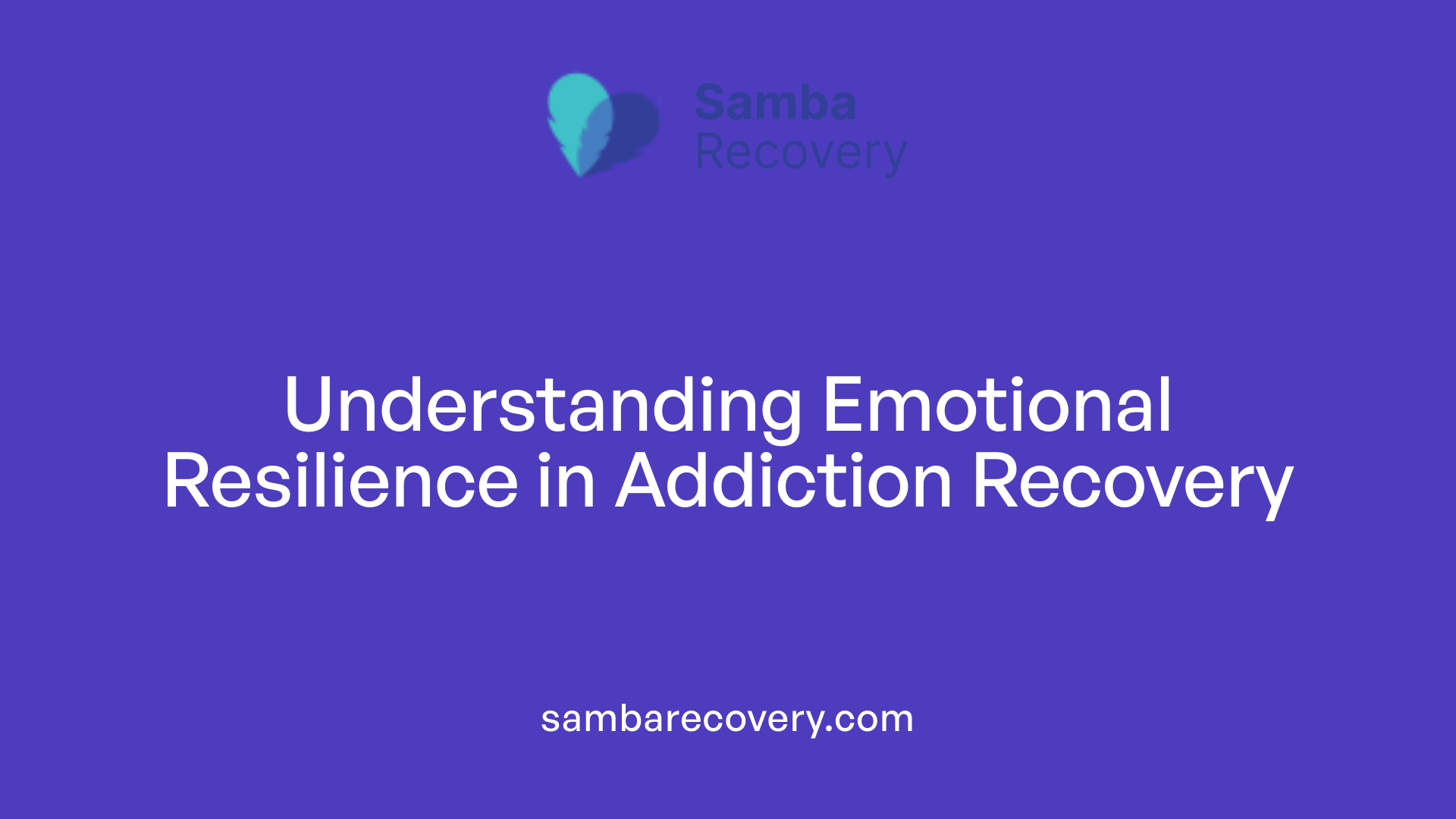
Why is emotional resilience important in addiction recovery?
Emotional resilience plays a pivotal role in addiction recovery by equipping individuals to navigate the challenges they encounter. This inner strength helps them acknowledge reality, derive meaning from their experiences, and adapt to ever-changing situations, which is critical for overcoming recovery hurdles. Such resilience fosters healthy coping mechanisms to manage stress and tackle unexpected obstacles, effectively reducing the risk of relapse when times get tough.
Key aspects of resilience include:
- Strong support systems: Building connections with family, friends, and recovery groups can provide essential emotional backing during tough periods.
- Self-care practices: Engaging in physical activity, maintaining a nutritious diet, and ensuring adequate sleep are vital for emotional well-being.
- Emotional regulation: Learning to manage feelings constructively helps to avoid reverting to addictive behaviors during emotional highs and lows.
Research underscores that maintaining positive emotions and employing proactive problem-solving approaches correlates with reduced substance use rates, solidifying resilience’s importance in sustaining sobriety. Ultimately, emotional resilience empowers individuals to face their recovery journey assertively, encouraging them to transform challenges into opportunities for growth and, thereby, enhancing their chances of long-term recovery success.
Developing Emotional Resilience During Recovery
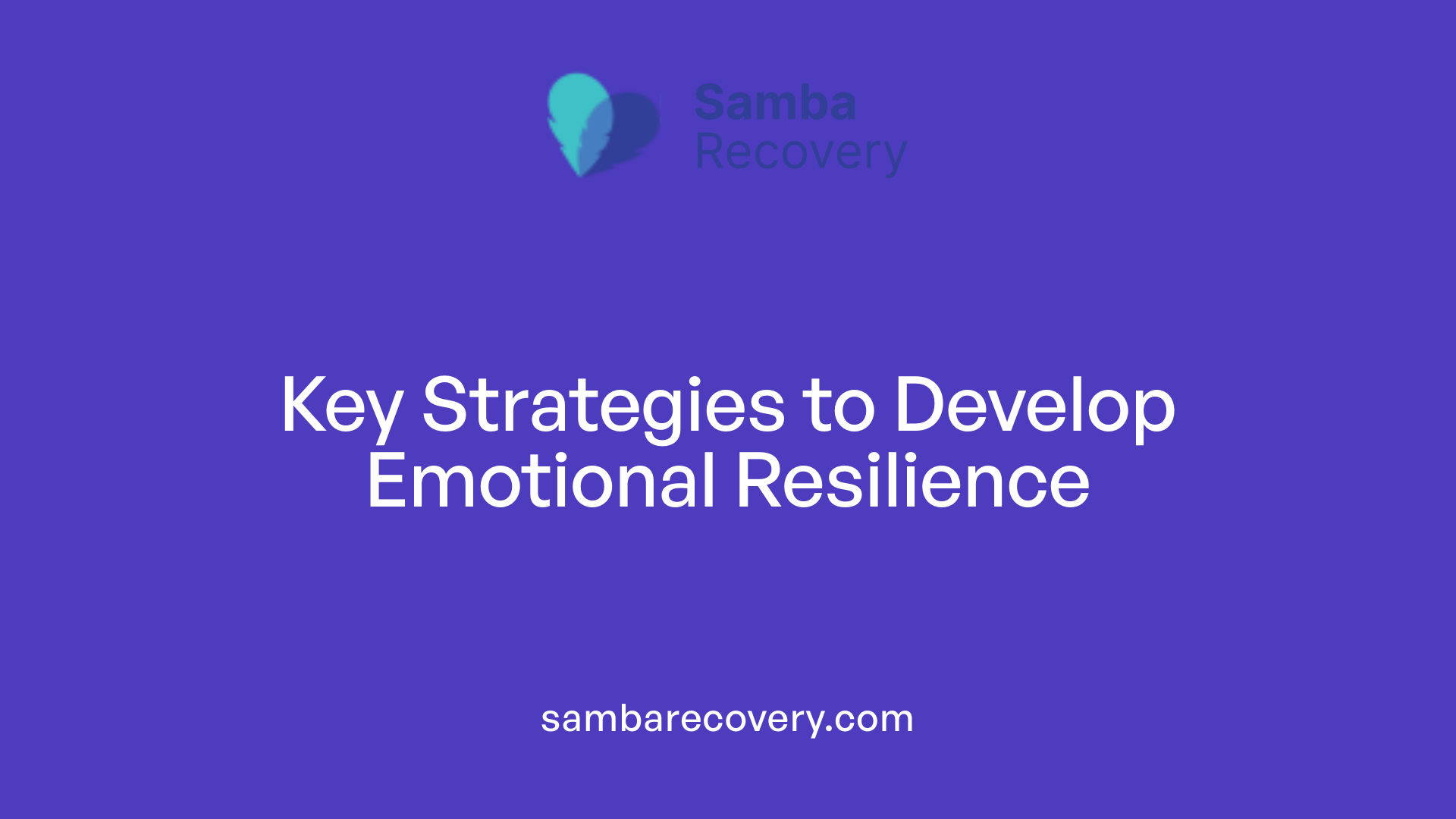
How can one develop emotional resilience during recovery from addiction?
Developing emotional resilience during recovery from addiction involves several key strategies. First, maintaining physical health by prioritizing sleep, nutrition, and exercise can significantly enhance mental well-being. Engaging in mindfulness practices, such as meditation, can help individuals manage stress more effectively, providing the tools to navigate cravings and emotional triggers.
Building a supportive network is crucial. This includes connections with friends, family, and support groups, which offer emotional backing during challenging times. Group settings, like those in Alcoholics Anonymous, provide shared experiences that reinforce hope and accountability.
Furthermore, identifying stress triggers and organizing daily tasks efficiently can prepare individuals to handle high-stress situations. By focusing on small, achievable goals, individuals can foster a sense of accomplishment, strengthening their resilience over time.
Strategies for enhancing emotional resilience
To enhance emotional resilience, one can adopt several strategies:
- Practice self-compassion: Be kind to oneself during setbacks, which fosters a healthier recovery process.
- Shift negativity: Reframe negative thoughts into positive reflections to overcome challenges.
- Focus on gratitude: Daily appreciation practices can shift the mindset toward positivity, aiding emotional balance.
Role of physical health and mindfulness in resilience building
Physical health is directly linked to emotional resilience. Regular exercise, a balanced diet, and adequate sleep strengthen not only the body but also improve mood and cognitive function. Mindfulness practices enhance self-awareness, allowing individuals to process emotions in a healthy manner, essential for maintaining recovery.
Utilizing support networks for emotional strength
A robust support system provides practical and emotional assistance, making individuals feel less isolated. Friends, family, and recovery groups can offer encouragement and accountability, vital components for sustaining resilience. Sharing personal experiences reinforces hope and fosters a sense of belonging, crucial for navigating the complexities of recovery.
Techniques for Building Resilience in Recovery
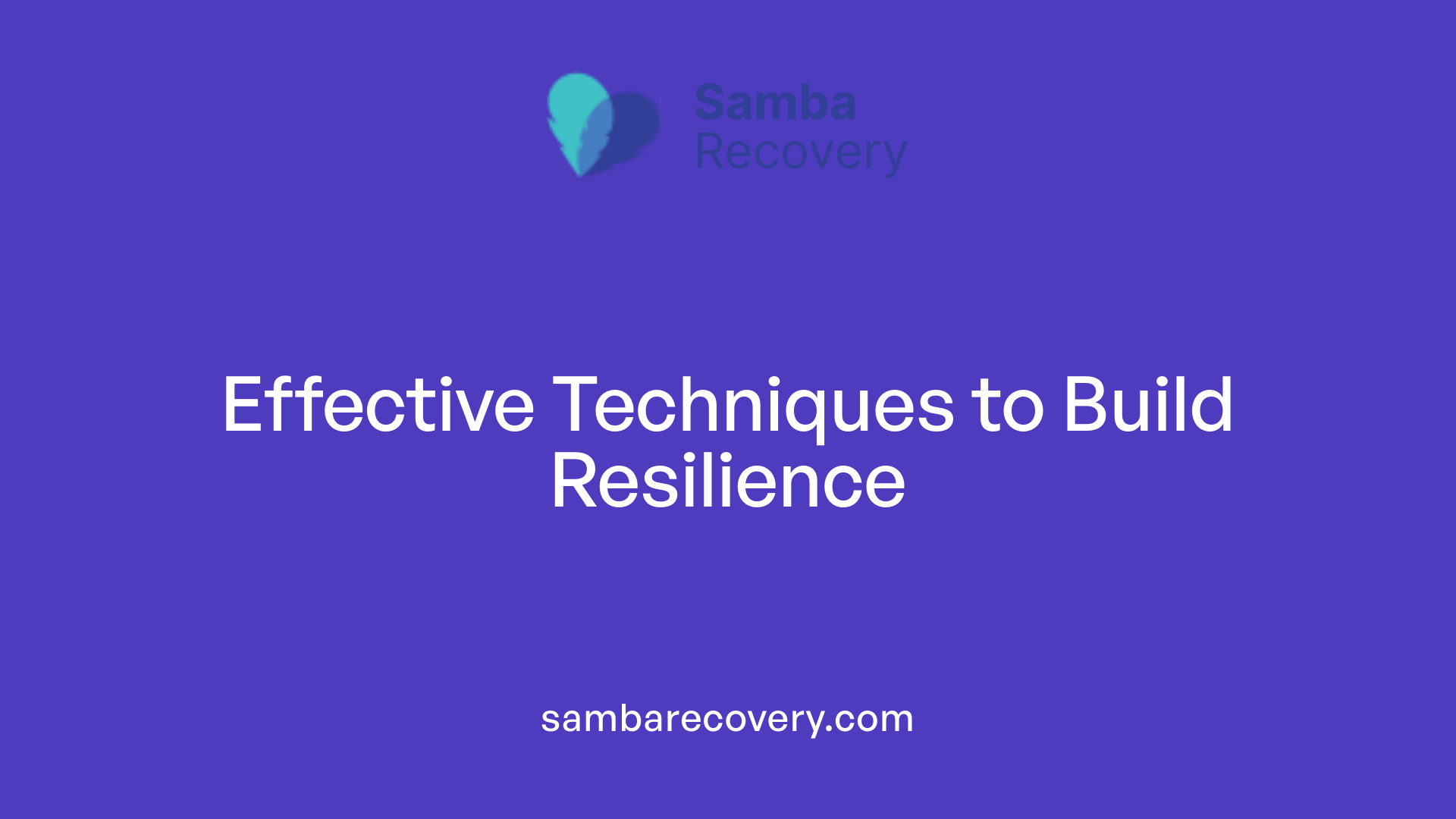
What are effective techniques for building resilience in addiction recovery?
Building resilience in addiction recovery involves a multifaceted approach that integrates several effective techniques. Here are some key practices:
- Regular Exercise
Engaging in physical activity not only boosts mood but also reduces stress, which is vital for maintaining sobriety. - Meditation and Mindfulness
These practices enhance self-awareness and help individuals manage impulsive behaviors and cravings. Mindfulness enables individuals to focus on the present, reducing anxiety about the future. - Seeking Social Support
Connecting with friends, family, and support groups like Alcoholics Anonymous is crucial. Sharing experiences and receiving emotional backing can help individuals feel less isolated. - Positive Self-Talk
Reframing negative thoughts reinforces a growth mindset, turning challenges into opportunities for learning and resilience. - Setting Realistic Goals
Establishing daily and long-term goals provides direction and motivation, marking milestones in the recovery journey.
Accessing resources, such as SAMHSA’s National Helpline, offers support and treatment referrals, especially for individuals without health insurance. Overall, resilience is a lifelong skill that grows through continuous effort and practice. Each recovery journey is unique, and incorporating these techniques can foster a stronger foundation for handling future challenges.
The 3 P’s of Resilient Thinking in Recovery
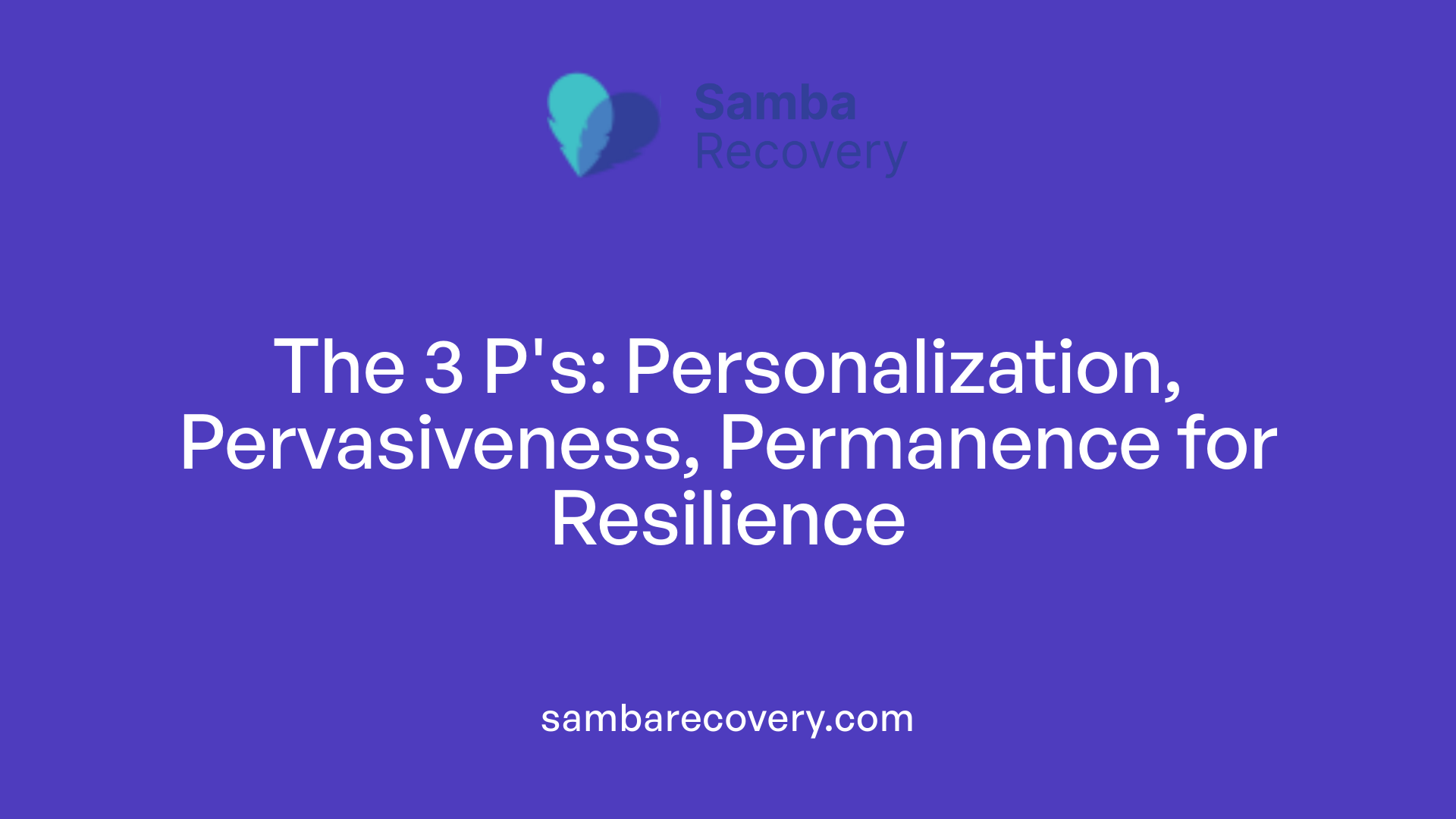
What are the 3 P’s of resilient thinking and their significance in recovery?
The 3 P’s of resilient thinking, introduced by psychologist Martin Seligman, stand for Personalization, Pervasiveness, and Permanence.
- Personalization: This principle encourages individuals to avoid blaming themselves for negative occurrences, promoting a more balanced and healthy self-image. By shifting focus from self-blame to understanding external factors, individuals can foster a more supportive mindset conducive to recovery.
- Pervasiveness: This aspect reminds individuals that one setback does not doom every part of their lives. Recognizing that the impact of a challenge is often limited helps maintain hope and clarity, allowing individuals to identify unaffected aspects of life.
- Permanence: This principle involves realizing that negative circumstances and emotions are not everlasting. Understanding that emotional states are temporary enables individuals to manage their feelings more effectively, reducing the risk of reverting to unhealthy coping mechanisms.
Together, the 3 P’s promote reframing negative thoughts, fostering a proactive approach, and ultimately enhancing resilience in recovery from addiction. By applying these principles, individuals can cultivate a more positive outlook, facilitating personal growth and sustained sobriety.
The Power of Social Support and Self-Care in Recovery Resilience
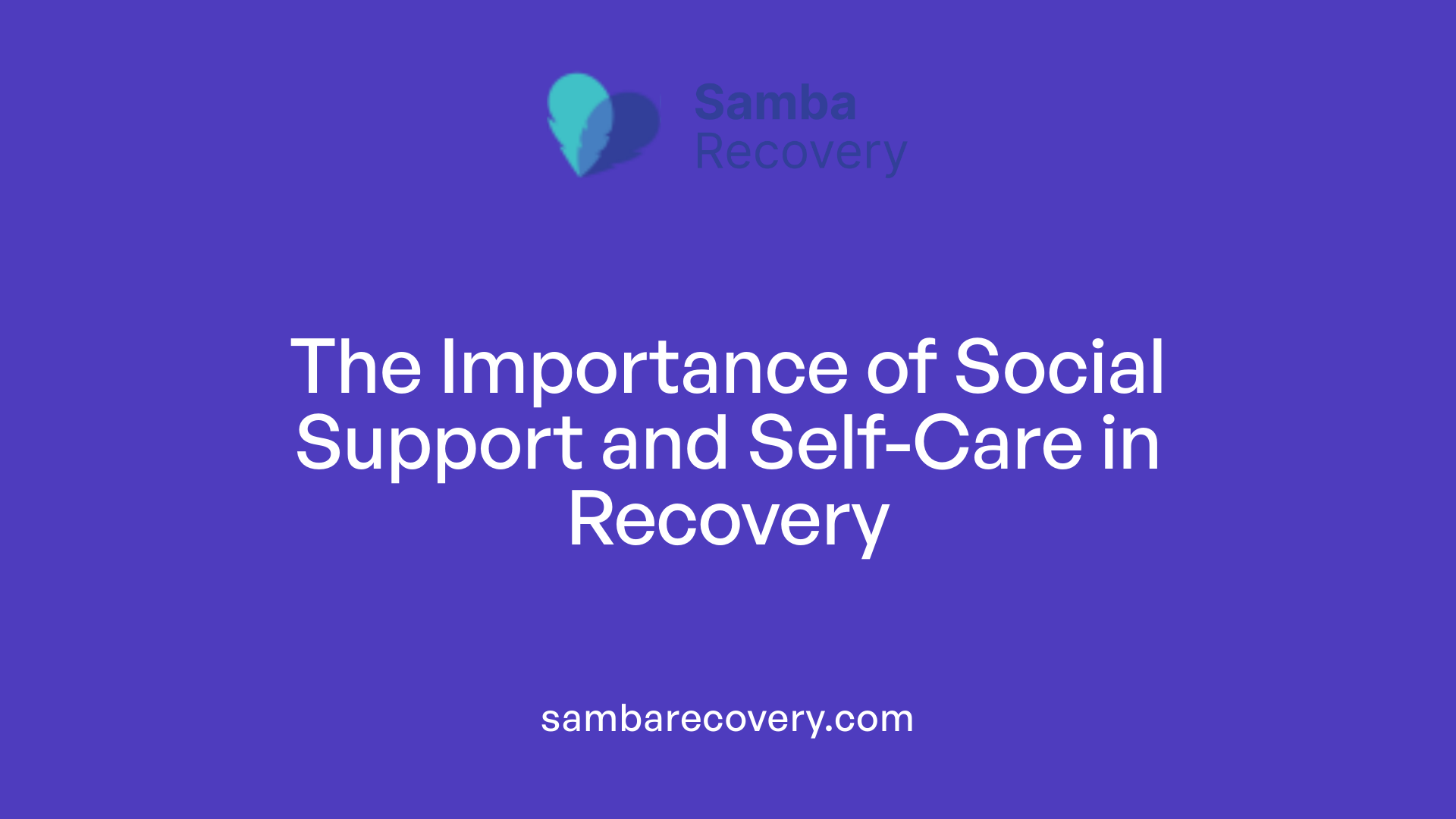
How do social support and self-care contribute to building resilience in recovery?
Social support and self-care are fundamental for establishing resilience during recovery from addiction. A personâs support network can provide not only emotional backing but also practical assistance during tough times. For instance, participation in support groups, like Alcoholics Anonymous, fosters a sense of community, helping individuals feel less isolated and more connected. This strong social fabric can significantly enhance treatment outcomes, equipping individuals to resist the temptation of relapse.
In parallel, self-care practices are crucial for maintaining well-being and enhancing resilience. Engaging in regular exercise, eating a balanced diet, and ensuring adequate sleep are foundational to managing stress and boosting emotional health. Mindfulness practices, such as meditation, can also improve emotional regulation, allowing individuals to process feelings constructively rather than reverting to substance use.
Self-care routines that enhance resilience
Several self-care strategies can help reinforce resilience:
- Regular Physical Activity: Exercise not only boosts physical health but also releases endorphins that enhance mood.
- Mindfulness Practices: These include techniques such as deep breathing and meditation, which help manage anxiety and provide clarity in stressful moments.
- Adequate Rest: Sufficient sleep is crucial for emotional balance, helping individuals face daily challenges with a clear mind.
- Healthy Social Relationships: Maintaining connections with others reduces feelings of loneliness and increases support during crises.
Integrating both social support and self-care into daily life creates a robust framework for resilience in recovery. The combined effect not only improves psychological well-being but also fosters a positive mindset that is essential for navigating the ups and downs of the recovery journey.
Mindfulness and Positive Self-Talk: Enhancing Resilience
Role of Mindfulness in Stress Management
Mindfulness is a practice that encourages individuals to be present in the moment. By focusing on the here and now, one can effectively manage stress and cravings, essential elements in addiction recovery. Mindfulness allows individuals to recognize emotional triggers early on, preventing potential relapses. Techniques such as deep breathing and meditation foster emotional regulation and can significantly enhance resilience.
Benefits of Positive Self-Talk
Positive self-talk helps reframe negative thoughts, transforming them into opportunities for growth. This shift is vital for maintaining a hopeful outlook during recovery. When challenges arise, using affirmations like “I am capable” reinforces self-belief and resilience. Cultivating a positive mindset directly contributes to better decision-making and emotional stability.
Practical Ways to Incorporate Both Into Daily Routines
Integrating mindfulness and positive self-talk into everyday life can be straightforward. Here are some suggestions:
- Daily Meditation: Spend 5-10 minutes in silence, focusing on your breath.
- Gratitude Journaling: Write down three things you are grateful for each day to focus on positivity.
- Affirmations: Start the day with positive statements about yourself and your goals.
- Mindfulness Reminders: Set alarms on your phone to pause and take mindful breaths throughout the day.
- Engage in Nature: Spend time outdoors, appreciating your surroundings to boost awareness and gratitude.
Personal Experiences and Growth Through Resilience
Sharing Recovery Stories
Personal narratives are powerful tools in the journey of recovery. Sharing individual recovery stories allows for connection and understanding among peers. It can inspire hope and demonstrate that overcoming struggles is possible. Many find solace in hearing about the obstacles others have faced and how they navigated through those tough times, making it easier to believe in their own capacity for change.
Adjusting to Change and Embracing Growth
Recovery often involves significant life changes, and adaptability is essential. Those in recovery learn to view challenges as opportunities for personal growth. By accepting that change is part of the recovery journey, individuals cultivate resilience. Reframing setbacks into lessons contributes to a proactive approach, enabling individuals to emerge stronger and more self-aware.
Advice for Caregivers Supporting the Journey
Caregivers play a critical role in supporting individuals through recovery. It’s important for them to practice patience and offer a strong emotional backup. Encouraging open communication about feelings and challenges can foster a sense of safety. Caregivers should also prioritize self-care, as their well-being is vital for maintaining a supportive environment. Acknowledging and celebrating small achievements in recovery reinforces hope and motivation for both the individual and their support network.
| Recovery Aspect | Importance | Suggested Practices |
|---|---|---|
| Sharing Stories | Builds connection and hope | Recovery groups, forums |
| Adaptability | Enhances resilience through change | Mindfulness, flexibility |
| Caregiver Support | Strengthens emotional safety | Open dialogue, self-care |
Cultivating Emotional Resilience for Lifelong Recovery
Building emotional resilience is pivotal in ensuring a successful recovery journey from addiction. By understanding and applying the principles discussed, individuals can navigate the path of recovery with greater confidence and strength. Resilience provides the foundation for enduring sobriety and helps to transform challenges into opportunities for personal growth. This continuous process of nurturing resilience through self-care, social support, and personal development ultimately leads to a fulfilling, balanced life free from the constraints of addiction.
References
- Developing Resilience and Mentally Strong Habits: Do’s and Don’ts
- Resilience in Recovery: What It Means, and How To Build It
- 10 Ways to Develop Resilience in Sobriety | Eudaimonia Sober Living
- How to Build Resilience in Recovery – Gateway Rehab (GRC)
- Building Resilience: 5 Recovery Tools for Addiction
- 5 Strategies for Building Resilience In Early Recovery
- Building Up Emotional Resilience: The Key to Recovery






